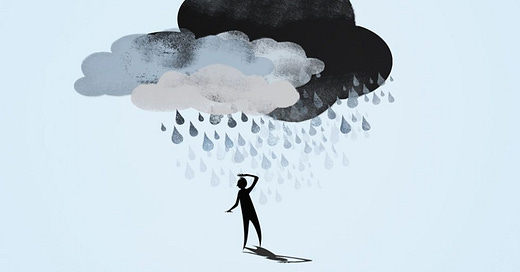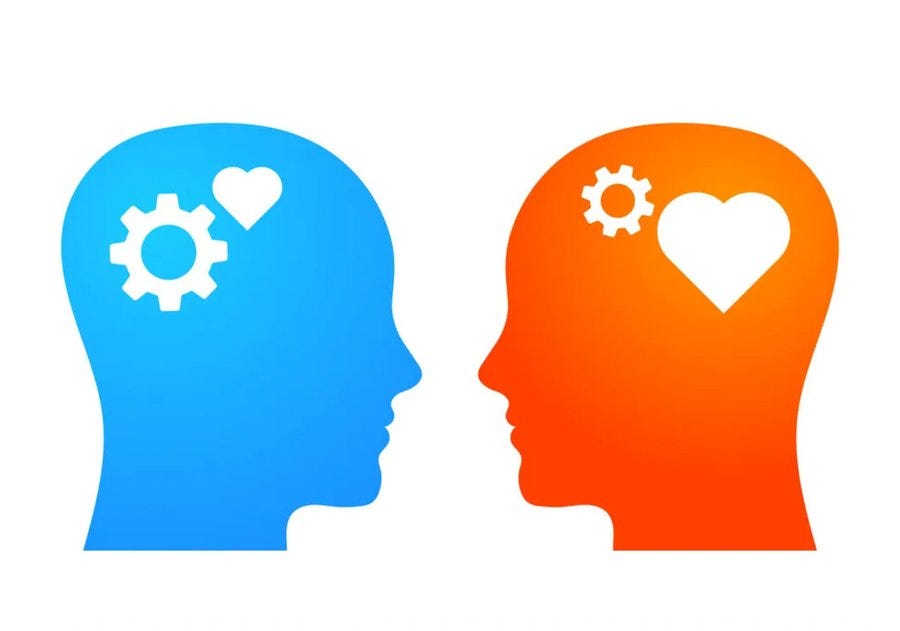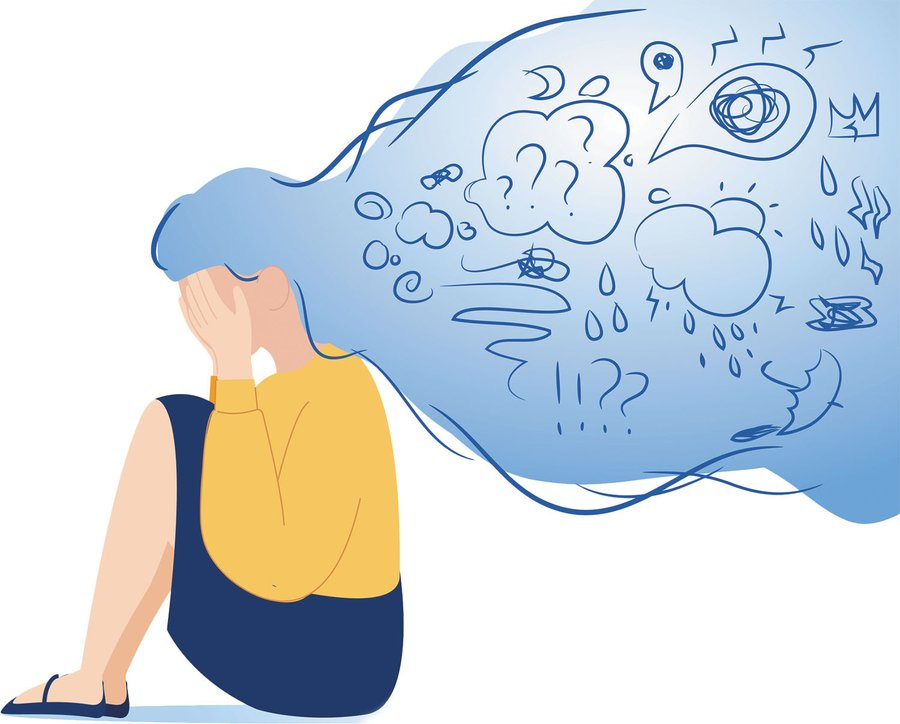My Search
I spent over 20 years trying to solve the mystery of my depression, and I’ve long since lost count of the number of theories I’ve come across over the years as to what, exactly, causes it. Was it genetics, chemical imbalances, addiction, the gut microbiome, trauma, factors from childhood, relationships, lack of exercise, metabolic dysfunction, or some combination?
Every time I came across a new theory, I made it my primary mission to exhaustively research and test it until I was forced to either accept it as truth, or toss it into the ever-growing pile of failed hypotheses.
Although it took much longer than I thought it would, I am confident I have found the answer. That answer is perceived helplessness, and it holds true for all animals capable of experiencing depression, trauma, and anxiety.
Before elaborating on this conclusion, how I came to it, why I am so confident it’s correct, and what the implications of it are, I believe it will be useful to briefly define a couple terms, as well as cover some important facts about the functions of, and relationship between the “thinking” and “feeling” components of the human experience. These are important to understand for reasons which will soon become apparent.
Helplessness:
Inability to take action against experiences – the feeling of having no, or limited control.
Agency:
The opposite of helplessness; the ability to take action and exercise some level of control over your experiences and life, or to accept that which you cannot control.
The “Thinking” and “Feeling” Selves
Generally speaking, the “feeling self” is concerned with things like your nervous system, the right side of the brain, the hippocampus, the amygdala, and the gut. The feeling self is exactly what it sounds like (what you feel), but there’s a bit more to it than that.
Instinct, desire, emotions and, of course, what you physically feel, are all experiences of the feeling self. In many ways, your feeling self is the core of your identity; it is the part of you that largely operates in the world without your specific and purposeful instruction. It’s the part of you that dominated the experiences of your life in infancy; the part of you that “reacts” to experiences before your conscious mind has time to catch up.
If someone pops out from behind a corner and startles you, it is your feeling self generating the reaction. Similarly, the automated feeling of apprehension you develop while approaching a corner, if you’ve been startled one too many times, is also part of your feeling self!
The thinking self, on the other hand, is more concerned with the left side of your brain, the prefrontal cortex, and other parts of the cerebrum. The thinking self is what you’re currently using to read this post, to consider what’s in it, to decide what you’re going to do when you’ve finished, etc. It also happens to be the part of you that separates you from a purely instinctual animal.
We have something no other animal has, though: A well-developed ability to notice, conceptualize, evaluate, critique, and communicate with ourselves at a high level. In other words, we have a “Thinking Self” which exists in a constant relationship with our “Feeling Self”. This means that, unlike other animals, we are capable of observing our own suffering, coming to conclusions about it, and even learning to resent ourselves and others for it.
If you’ve ever asked yourself, “Why do I keep doing this?”, then you’re already intimately aware of what it’s like to use your thinking self to question, consider, and observe your feeling self. There are many important implications of this fact, some of which come into play in this particular discussion.
Of course, these are gross oversimplifications that leave out a large number of contributing systems and complex interactions, but they can help to distinguish between our more automated, instinctual, and emotional functions versus our purposeful, logical, and contemplative ones.
It should be noted that many of these systems are far from perfectly understood, and there are certainly disagreements regarding their functions and relationships with one another. Despite the inevitable disagreements, many of humanity’s findings on these systems corroborate strongly across multiple disciplines which seek to understand the experience and function of human life, and there are an incalculable number of ways to learn about and understand them.
I have chosen to simplify them into the thinking and feeling selves because I believe these monikers are satisfactory for understanding their functions and relationships with each other as they pertain to the subject matter discussed in this post, and the experiences of human life tend to comfortably fall within one or both of these generalized “selves”.
Okay, so what does this have to do with depression, anxiety, and trauma?
Let’s start with anxiety, as it is undoubtedly the most commonly shared experience of the three.
Anxiety:
Cause: Momentary feelings of helplessness in the feeling self.
Anxiety is a type of creativity, and creativity is a process the brain engages in to achieve agency (the opposite of, and “antidote” to helplessness) over some element of our existence in the world. Whether it’s problem-solving, innovation, pursuing curiosity, brainstorming, creating art, etc. Creativity is simply an attempt to understand something about the world or ourselves, and exercise our agency over it; it is one of the ways we contribute to, develop our relationship with, express our feelings toward, and come to understand reality.
Creativity is triggered when we instinctually or purposefully see a potential benefit of exercising it. Anxiety is negative creativity exercised in a misguided attempt to achieve agency over difficult past or future experiences. We are either worried about something that has already happened, or something that might happen, and we attempt to prepare ourselves for the worst possible implications of these experiences.
We are attempting to experience a sense of control over the things which have caused, or may cause us pain, and we do this by using our negative creativity to simulate potential experiences. Unfortunately, we have no ability to achieve present agency (short of acceptance) over past or future experiences and so, by attempting to achieve it, we experience helplessness, instead.
Of course, it’s not necessarily true that you can’t do anything about whatever it is you feel helpless toward, but your body isn’t always going to factor this truth in before it starts freaking out and causing you to feel powerless and anxious. In many cases, the damage is done long before we are able to consider whether or not it was necessary.
Trauma:
Cause: Experience of severe helplessness which becomes deeply, and improperly integrated into the feeling self.
Trauma is a moment, or series of moments in which we experience a perception of severe and overwhelming helplessness. When the body experiences particularly debilitating helplessness, it attempts to automatically protect us by integrating what it perceives as exceptionally threatening elements of the experience into the feeling self (nervous system, emotional brain, etc.), so as to automatically protect us from similar threats in the future. If the body is helpless to exercise agency against the threat itself, then it will, instead, exercise agency against your experience of the threat.
Trauma is a messy, incomplete, and maladaptive integration of exceedingly painful experiences into the self. This “messiness” occurs as a result of the desperation of the mind and body to “help” us survive what is otherwise felt as a profoundly helpless, and potentially life-threatening experience.
Depression:
Cause: Persistent and repeated helplessness integrated into the feeling self.
Depression is a function of your perceived inability to effectuate your needs and desires in day-to-day life. It is a survival adaptation which occurs when persistent and/or severe helplessness become integrated into the feeling self, and corrupt large chunks of our identity and ability to exercise agency in every-day life.
Unlike trauma and anxiety, depression is a sustained, often ever-present experience of helplessness. The severity of depression depends on the extent to which our identity and lives have been corrupted by the helplessness, and how severe and often that helplessness is felt.
If your body and mind feel severely and/or persistently helpless in their ability to produce and acquire your needs and desires; the things you want from your life, then they will adapt to a low-energy state of metabolic dysfunction and defeat. We are, after all, adaptation machines. Depression, like trauma, is a maladaptive, physiological survival response, and a body which has adapted to helplessness has no reason to operate at full capacity. The body makes every attempt to avoid waste and, when energy against an experience repeatedly proves wasteful, the body will simply stop, or reduce its ability to provide it.
Despite what many believe, depression is a very real psychological AND physiological condition. Don’t believe me? For the science-literate, here’s a woefully incomplete list of physiological changes which have been
to occur in people suffering from severe depression:
Decreased number of mitochondria
Decreased mitochondrial health
Reduction in ATP signaling, production, and efficiency
Severely reduced and misallocated brain activity/energy
Presence of high-beta brain waves, and absence of alpha waves
Dorsal Vagal Complex dysregulation (permanent fight, flight, or freeze state)
Severe endocrine disruption (too many examples to list)
Physical damage to the nervous system, and cooperating systems
The adaptation to a state of depression is often accompanied by varying degrees of numbness (dorsal vagal freeze and/or metabolic dysfunction), as the body becomes incapable of tolerating further suffering, particularly the severity of suffering experienced while the nervous system is functioning normally (without having been corrupted by depression). Essentially, the nervous system decides that the only way to survive is to shut down its ability to feel and exist in any normal capacity.
When an animal feels helpless against its suffering for long enough, its nervous system becomes trained to accept defeat. This is a survival mechanism in which the nervous system has come to understand that nothing it does appears to have any impact on reducing the suffering experienced, and so, depending on the severity of the suffering, it shuts down or changes certain parts of itself. Instead of operating normally and “living” alongside the animal, it enters a low-energy state of survival.
The Inevitable Identity Crisis of Helplessness
Although depression, trauma, and anxiety in humans ultimately come from the same source (helplessness), we are unique in how we experience them, as well as how they impact us. If our depression persists for long enough, we are guaranteed to eventually develop an identity disorder, as a result.
Depression, in humans, produces a schism within the self; a fear of embracing and living alongside the fundamental components of our identities which we have come to resent and blame for our suffering. Depression is, in essence, a helplessness-induced identity disorder. A chronically depressed person’s relationship with themselves is an abusive and/or neglectful one, and this abuse can go entirely unnoticed or be outright ignored by the person experiencing depression, just as it can in any other abusive relationship.
This identity disorder occurs because, once we have experienced and considered our helplessness for long enough, our thinking and feeling selves disconnect from and enter into an abusive relationship with each other. While the specific catalysts for this disconnect can vary from person to person, the eventual result is the same. If we are given enough time to observe, consider, and come to conclusions about our suffering and helplessness, we begin to resent, and eventually enter into a war with ourselves; with the identity we have come to blame for our suffering.
How Did I Come to This Conclusion, and Why am I Confident it’s Correct?
This conclusion is the result of countless thousands of hours of research, observation, discussion, personal experience, etc. The truth is, I couldn’t begin to detail the road leading up to it if I tried. In many ways, it was simply a matter of trial and error; of endless digging through studies, stories, articles, experiences, discussions, etc., until I finally landed on something that “fit”.
With that said, there were at least a few key moments that lead to the discovery of this conclusion.
During my research, I noticed that every single depressed person I had ever spoken with, listened to, read about, or observed, had a few very important things in common, myself included.
All of them felt at odds with themselves (resentful, afraid, abusive, neglectful of their feeling selves; elements of their identities), and engaged in self-destructive behaviors
All of them felt helpless in their ability to achieve certain things they wanted in life
All of them frequently operated in low-energy states of lethargy, apathy, numbness, etc.
All of them had developed different coping mechanisms (misplaced agency against their helplessness; unhealthy survival habits)
Of course, this list isn’t comprehensive, but it was enough to set me on the right track.
Ultimately though, it was the patterns shared by both the catalysts which frequently resulted in depression, as well as the treatments which relieved people from it, that lead to my conclusion.
Why are some things able to cause depression so reliably?
Why do some people seem unaffected by these things?
Why does EVERY theory for the cause of depression seem to have some level of truth behind it?
Why do certain treatments work for some people, and not for others?
Why do some treatments have a higher success rate than others?
Why has depression increased so much in recent years?
Why is depression practically unheard of in small, and simple communities?
Why is depression so high in certain groups of people?
If my conclusion couldn’t neatly account for every single one of these questions (and countless others), patterns, observations, etc., then it was of no use to me. Luckily, the theory of helplessness manages to perfectly account for ALL of these things.
Why are some things able to cause depression so reliably; things like trauma, poor physical health, grief, abusive relationships, failure, etc.?
Because the more likely an experience or condition is to result in helplessness, the more people it will impact. Certain life experiences will induce helplessness in nearly every person who experiences them (death of a loved one, life-threatening experience, severe physical injuries, etc.), while others may only affect specific kinds of people.
Why do some people seem unaffected by these things?
Because helplessness is often a relative experience. What may be considered a profoundly helpless and traumatic experience for one person, can be experienced as benign, or even agentic, by another. Remember, it’s your PERCEPTION of helplessness that matters.
Why does EVERY theory for the cause of depression seem to have some level of truth behind it?
Because ALL of the theories are correct. That is, any proposed cause of depression which is capable of inducing helplessness to at least one person, can rightfully be considered a cause of depression. Metabolic health, addiction, trauma, chemical imbalances, factors from childhood, etc. They ALL fit, and they can all produce helplessness.
Why do certain treatments work for some people, and not for others?
Because although agency is ALWAYS the antidote to helplessness, relief from depression is ultimately unique for each person. That is, a person’s ability to leave their depression behind depends on whether or not their chosen treatment plan appeals to their unique helplessness and agency. If a course of treatment cannot correct a person’s unique experience of helplessness by replacing it with a unique experience of agency, then the treatment will fail to work.
Why do some treatments have a higher success rate than others?
Just like how certain things are more likely to result in depression for most people, the same is true regarding treatments. The more likely a treatment plan is to result in the development of agency precisely where it is uniquely needed, the more likely that treatment will prove successful. As it turns out, certain treatments are better at producing this outcome, for a larger number of people, than others.
Why has depression increased so much in recent years?
Because we are living in a time which produces and exacerbates record levels of helplessness. Poor nutrition, identity confusion, neglect, resentment, manipulation, and abuse, lack of exercise, lack of purpose, excess screen time and social media, dopamine/adrenal dysregulation, addictions everywhere(gaming, porn, drugs, alcohol, etc.), obsession with safety, ideological zealotry and resentment (Wokeness), fear and isolation (Covid), and countless other things which are all but guaranteed to produce massive amounts of helplessness in the average person.
Why is depression practically unheard of in small, and simple communities?
Because simplicity of life choices and experiences is strongly correlated with one’s ability to achieve agency. The more complex a civilization and culture are, the more opportunities there are to experience helplessness.
Why is depression so high in certain groups of people, and so low in others?
Because, for many different reasons (some of which are listed above), certain groups of people are more or less vulnerable to experiencing helplessness. Depression is very high in the following groups (and others). Using what you know about these groups, as well as the information discussed thus far, can you guess why?
Victims of trauma and abuse
Video game, porn, drug, and alcohol addicts
The trans/queer community
Political and ideological zealots
Obese people
People who live in big cities
How about the groups depression is very low in?
Small communities
Physically fit/healthy people
People who severely limit things like screen time, social media, gaming, porn, etc.
People with jobs that require simple, manual labor
People with financial security
Ultimately, I found ALL of my questions answered by this theory of helplessness and agency. Not only that, but the theory is the only theory I’ve ever come across that can be used to induce, or cure depression with a 100% success rate. Every. Single. Person. suffering from depression I have ever observed, spoken with, read about, or listened to, seems to fall into this theory of helplessness - typically in more than one way. Likewise, every person who has ever escaped it, accomplished it with agency, myself included.
Of course, this post wouldn’t be complete without at least briefly mentioning how I used this realization to cure my own depression. I tried practically every single treatment in existence, and none of them worked for me for more than a short period of time.
Therapy
Medications
Supplements
Nutrition
Exercise
Life coaching
Countless self-help books and programs
Meditation and breathwork
The reason none of these treatments ended up working for me was because I didn’t understand what the common denominator for success was; I didn’t understand what, specifically, I was trying to accomplish with them. I simply knew they worked for other people, and figured that if I engaged in them, then something would end up working for me.
It was like having a giant, studio soundboard in front of me, and I was simply randomly flipping switches and turning dials until something worked. In the end, I realized that I had failed to turn the damn thing on; I didn’t understand the most important and fundamental truth to achieving what I wanted.
Then, I found psychedelic therapy. Without getting into too much detail
(I recently finished writing a book on all of this, including the information discussed in this post
), psychedelic therapy ended up working for me because it helped me repair the relationship with my identity. As my relationship with myself improved, it become significantly easier to understand what my feeling self was communicating to me regarding the helplessness it was experiencing, as well as which paths of agency could lead me to heal.
Psychedelic therapy helps to reveal deep and important truths about your identity and, if you want to discover the source of your helplessness (the location of the “on” switch for your soundboard), then developing a healthier relationship with yourself will likely be a requirement.
Whichever method you choose to pursue recovery, please understand that addressing your helplessness with agency will ALWAYS be part of the process, even if it doesn’t necessarily seem like that is what’s occurring.










This is a very compelling hypothesis Bryan, and highly relevant to today’s zeitgeist. I’ve not seen an analysis of this subject broken down with such clarity. Well done. What have you done to test it more broadly? While it’s a good hypothesis, it may need further refinement. Keep in mind this advice from Albert Einstein:
“If I were given one hour to save the planet, I would spend 59 minutes defining the problem and one minute resolving it.”
If you have not already done so, I would partner with some exceptional non-ideological but deliberate scientists to refine and verify the hypothesis and test it out to develop a repeatable model from diagnosis and cure. In my experience, nothing matches mixing it up with people with big brains and strong opinions. You might be onto something big. Very nice!
Wow. Hugely insightful... its going to stick with me. I love narratives that cut right to the root of a problem. , great work ty! 🙏🏻